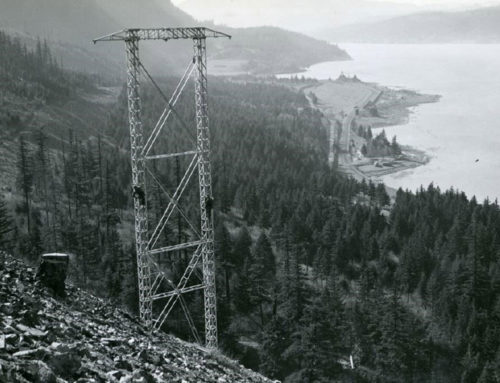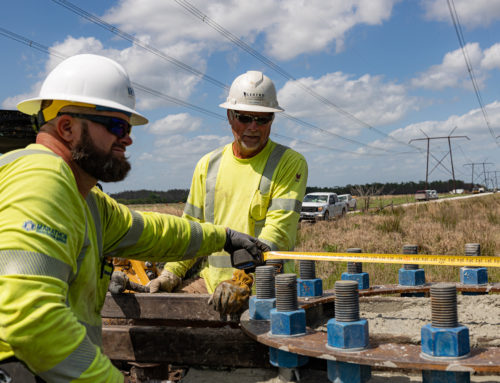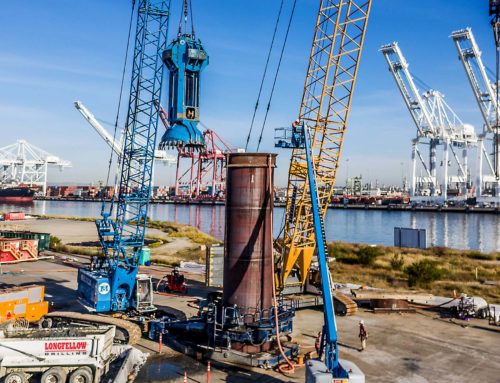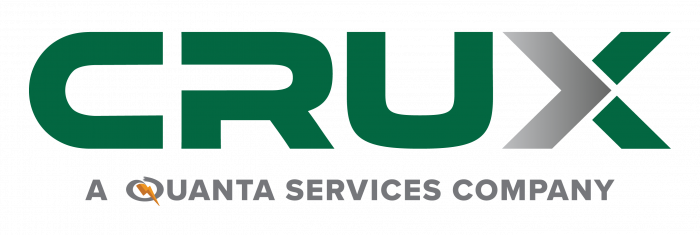Strength in Diversity
As an increasing number of companies and industries roll out diversity initiatives and the topic becomes more widely studied, we continue to see the benefits that a diverse, inclusive culture can yield. Diversity of race, ethnicity, age, education, and life experience – among so many others – create diversity of thought and have the potential to positively impact a company’s culture as well as its bottom line.
Gender diversity is no exception. According to a McKinsey & Company report, gender-diverse companies are 25% more likely to achieve above-average profitability than companies with less diversity. Though certainly a generalization, men and women tend to bring different approaches and viewpoints to the table. As one example, a paper from the National Bureau of Economic Research states that women are more likely to collaborate than men. Enhanced collaboration and communication can be an asset in any industry, but in construction, where projects often require a high level of collaboration to be successful, it can be particularly valuable.
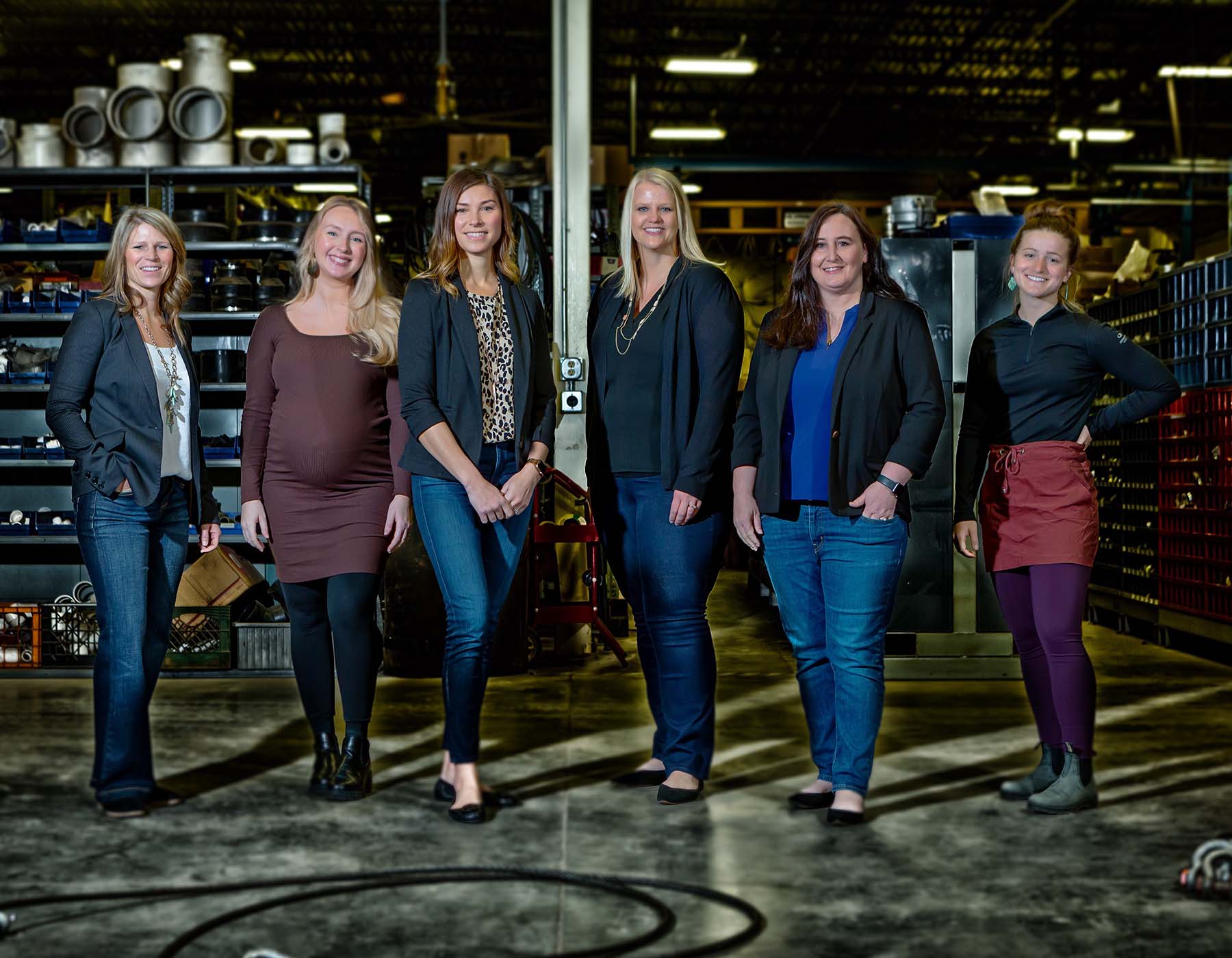
Team Members
Karen, Project Controls Manager
Sarah, Construction Engineer Project Manager
Robin, GIS Manager
Anna, Field Engineer
Aimee, Controller
Women in Construction
In 2020, women made up approximately 47% of the total workforce in the United States. Women in construction made up just 10.9% of the total workforce, meaning that the construction industry is only employing about 1.25% of women in the workforce. Though this number has been slowly increasing and is expected to continue in a positive direction, it remains low and presents a major opportunity for increased diversification within the industry. With the proven benefits of corporate diversity and close to half the workforce made up of women, it would seem it’s in the best interest of construction-related companies to take steps to hire and retain female employees.
A major selling point in female recruitment is the reduced pay gap as compared to other industries. According to the National Association of Women in Construction, women earn an average 99.1% of what men make in the construction industry for comparable roles. That said, there are still some major challenges to both recruiting and retaining women in construction industry roles. A study by The New England Institute of Technology suggests women in construction face the following:
- Exclusion: eight out of 10 women feel left out at company social events and gatherings.
- Lack of Advancement: Over 70% of female construction workers feel passed over for roles because of their gender.
- Shortage of Role Models: More than 45% of women in construction have never worked with female construction managers.
The shortage of role models is particularly troubling, as it can lead to a negative circular pattern. Part of creating a welcoming, inclusive corporate culture is enabling potential employees to see themselves in the workforce. Seeing people similar to yourself participating and thriving in the culture is a major advantage to recruitment and retention. Similarly, not being able to see yourself in the existing workforce may cause you not to apply with or stay at a particular company, thereby deterring individuals similar to yourself from doing so in the future.
The Women of Crux
Like many companies in the industry, Crux has seen consistent and continual growth in female employees. Compared to seven years ago in 2014, the total number of female employees has increased more than 50% and the percentage of total company compensation going to female employees has increased 8%. Additionally, average female employee compensation increased 59% for this same period compared to average male compensation increasing 37%. This signifies more female employees being hired in and/or advancing to elevated roles in the company and a much needed narrowing between the types of roles male and female employees are fulfilling.
Today, Crux has female employees filling key positions in almost every major department, including Accounting, Engineering, Geology, GIS/Quality Control, Human Resources, IT, Contract Management, Project Controls and Marketing/Business Development.
Meet Karen
Karen is our Project Controls Manager and has been at Crux for over 17 years. She oversees Crux’s Estimating department and plays an active role in operational tasks for all current and upcoming projects. Karen grew up in rural Washington and went to school in Central Montana, where she played basketball and received her BA in Business Administration. She completed her MBA at Eastern Washington University in Spokane, Washington, and lives here with her husband and two children.
"I knew the construction industry was male-heavy when I started, but it didn’t really impact my decision; I knew it was something I could handle. I also knew several employees at Crux when I started, which helped me feel more comfortable, as it would starting at any new company. There were no women in operations roles at that time, but this has changed over the years. I’d like to think I’ve helped shape the culture to make the road to female leadership less obstructed. I was the first female employee to have a child while working here eight and a half years ago and worked with HR to implement a maternity policy that has applied to several female employees here since. Of course, there have been challenges; it’s hard to stay true to yourself, fight off stereotypes and enjoy your career all at the same time, but I feel like I’ve achieved a good balance over time. At the end of the day, I think I’m successful at my work because I truly enjoy what I do and who I work with. I get to be on the forefront of every project, making decisions that affect everyone in the company, and I love that the industry is trending toward a place where more women are seeing these opportunities. I look forward to a time in the very near future where women filling executive roles at construction companies like ours is no longer an uncommon sight! "
Meet Sarah
Sarah is a Construction Engineer Project Manager that has been with the company for over five years. She spent her first four years at Crux as a Geotechnical Engineer on a major transmission line project in Southern California and is currently helping to manage a large-scale electric vehicle charging station build out. Sarah grew up in Hayden, Idaho, and completed a BS in Geological Engineering at the University of Idaho as well as MS courses in Geotechnical Engineering at the University of Washington.
"I sort of entered the industry by chance, but then realized it’s a perfect fit for me. I was good at math in high school and decided to take advantage of scholarships that the University of Idaho was offering in Mining Engineering. This is where I had my first Geology class, which I found incredibly interesting. More importantly, I really loved my classmates, professors and advisors. I worked in consulting engineering across the west coast for 10 years after college before deciding to make the switch to the contractor side with Crux. My dad owned an earthwork construction company while I was growing up, so I was already familiar with heavy equipment and construction site logistics, but I’m not sure I was overly prepared for being one of maybe five females on a project with over 100 employees. There was a definite feeling at first that, as a woman, I didn’t belong and was unworthy of being in the industry. I learned to enjoy the challenge of overcoming this and being an asset to the team by working hard, gaining an in-depth understanding of the industry, and being as helpful as possible. I’ve also found an unmatched comradery amongst females in the industry which I think is incredibly powerful and supportive!"
Meet Robin
Robin is our GIS Manager and started at Crux a little over four years ago. Robin grew up in Spokane, Washington, and graduated from Western Washington University with a BS in Geology. She and her husband have a one-year-old son and another on the way. Initially a Staff Geologist, Robin quickly came to understand the power of GIS in the electric transmission construction industry and has revolutionized the way the company uses it. She currently heads up an expanding department dedicated to data management and construction tracking/reporting for enhanced quality control.
"I don’t really see the construction industry being ‘male-dominated’ as a deterrent or a benefit, but rather an indication of an inevitable shifting of tides and an opportunity for new perspectives and strategies to help steer the future of the industry. There have been times where my male counterparts have been blatantly addressed over me in client meetings, or somewhat demeaning language has been used to describe the role I have or work that I do. It can be disorienting to handle those situations tactfully, and I’ve found myself hesitate to ask a question that I later hear a male colleague ask unabashedly. As a working mother, I’ve also faced the challenges of growing a family while trying to grow and maintain a career, which can certainly be more of a challenge when fewer employees at the company face the same thing. At the end of the day, the opportunity, challenge, and encouragement offered to me by Crux’s leadership and culture has been highly impactful in my career path. If I had entered the construction industry with a company that didn’t value making room for non-male ideas and advancement, I would have moved on to one that did. The female comradery that has resulted from this sort of culture has been one of the biggest positives I’ve experienced. Meeting/working with other women, at any level, and hearing about their experiences and career journeys is enlightening and puts my work into an entirely different perspective. Seeing the success of female leads who have worked in either the field or office (or both) and have been around since the female headcount was much lower, has also been essential in encouraging my journey to a leadership role. I like to see my peers of any gender be successful and earn credit where it’s due, but there’s something extra satisfying and encouraging about seeing one of my female peers be recognized for their work."
Meet Anna
Anna is one of Crux’s Field Engineers and has been with the company for two and a half years. In this role, she performs foundation drilling QA/QC work in the field for various projects across the United States and Canada. Anna grew up in Houghton, Michigan, a small town tucked in Michigan’s Upper Peninsula, and attended Michigan Technological University where she studied Civil Engineering.
"Both of my parents have been huge role models to me in choosing a career path. My father worked manual labor jobs his whole life and started bringing me to work with him as soon as I was old enough. My mother was an Assistant Superintendent with Isle Royale National Park. While not always specifically in construction, they both worked in roles that kept them outdoors and working with their hands. My job experience before coming to Crux – including concrete testing/ soil investigations, a summer as a National Forest Field Technician, and a summer in Yosemite National Park’s Engineering department – really solidified my wanting to be in the construction industry long-term. Being the minority as a female in the field never really bothered me and is likely one of the aspects that made me feel comfortable at Crux from the beginning. I grew up with an older brother, with mostly male cousins, and in a neighborhood full of boys, so this wasn’t a drastic change. That said, being a small, quiet, reserved female in the industry, I’ve certainly had some challenges. Sometimes I don’t feel that I get respect right away and have seen several instances where my abilities are doubted because of my gender. These are typically external encounters and not with Crux staff, and I try to take them as opportunities to step outside my comfort zone and build confidence in myself. I’ve been fortunate to have worked with an amazing group of field and office staff who have always made me feel welcome, qualified, and a part of the crew. Being in the field, we typically work and live within the same small proximity, and it really creates a sense of family. I wouldn’t trade working in this industry for anything and I highly encourage every female questioning whether they “belong” in construction to step out of their comfort zone and give it a try!"
Meet Aimee
Aimee has been Crux’s Controller for two years and has been in the construction industry for more than 18. She currently oversees an Accounting team of five, including a female Assistant Controller. Aimee grew up on a farm outside Spokane, Washington, and received her BA in Business Administration with an emphasis on Accounting from Eastern Washington University. She lives in Spokane with her husband and two teenage kids.
"I didn’t plan on entering the construction industry initially, but a few years out of college I began looking for a more challenging opportunity with room to grow. I found this at a large local construction firm, where I worked my way from an Accountant position to company Controller. I really enjoy construction accounting as it’s less black and white than other industries and allows for some critical decision making. I think I was a little naïve to the fact that the industry was so male dominated. As I grew into manager level positions, it began to impact me more. Being the only female in a room full of outgoing males can make it difficult to be heard, and I found it often took longer to gain respect. Efforts to be “gentlemanly” and not offend me have resulted in me being singled out as different, which can have the opposite effect of what was intended and make it more difficult to build relationships with coworkers. After so many years in the industry, I’ve definitely seen improvements. The overall industry culture seems to be shifting from an “old boys’ club” to being much more inclusive and welcoming for women. The culture at Crux specifically has allowed me to achieve a better work/life balance than I had in my previous role, which is a major positive at this point in my life with my kids the ages they are. My coworkers understand the importance of family and have the same values, which creates a more positive work atmosphere overall.
Takeaways
I have been fortunate to watch Crux’s evolution in tandem with the industry's over the past decade. I’ve been with the company for 12 years, starting as an intern and moving into roles in Logistics/Purchasing, Marketing and Business Development, and I’ve watched our female workforce grow from a small handful to where we are today. The primary takeaway for me in delving into my coworkers’ backgrounds and overall thoughts on diversity is that everyone’s journey is unique. We all have different views on how gender diversity – and diversity overall – should be emphasized and focused on, both in business and everyday life. We also have different priorities at various stages of life impacting our motivations for starting at a company or in an industry, and for staying there. What we all seem to value and agree upon is the need to feel comfortable, included and supported. Each of the individual journeys detailed in this article touches on some aspect of this. Feeling like you are part of a company or industry where you are accepted, and your work is appreciated, is a major factor in being satisfied with your career path. Crux has done an exceptional job providing this for its employees thus far, and we’re excited to see the growth and opportunity the future holds for the company.
"A diverse group brings diverse ideas, perspectives, and innovation to the table, which can yield major returns "
For the construction industry as a whole, the noticeable gap between women in construction-related positions and women in the American workforce represents a major opportunity for diversity, but it’s not the only one. Increased diversification in other aspects, such as race, ethnicity, age, and background, also presents opportunities for the industry and individual companies to enhance operations. Creating the initial space for this diversity incites a positive feedback loop, encouraging more diverse employees to join the team. A diverse group brings diverse ideas, perspectives, and innovation to the table, which can yield major returns. With benefits to individual employees, companies, and the industry as a whole, this is certain to be a trend we can expect to continue for the foreseeable future.

